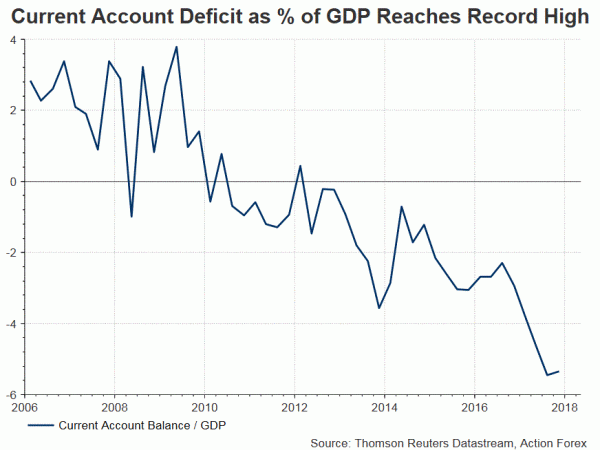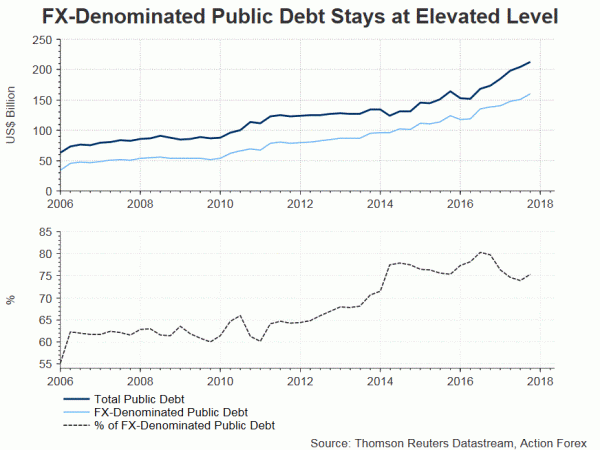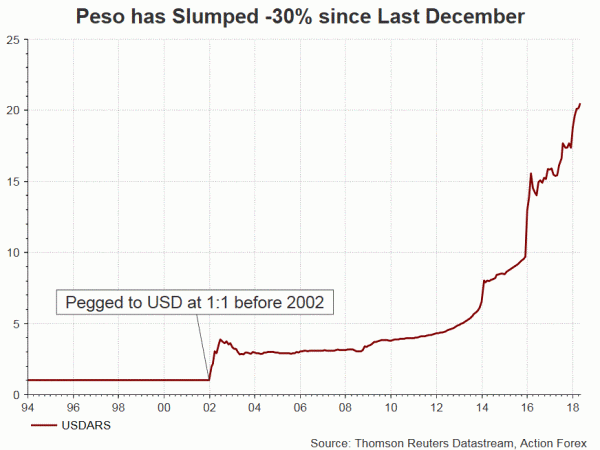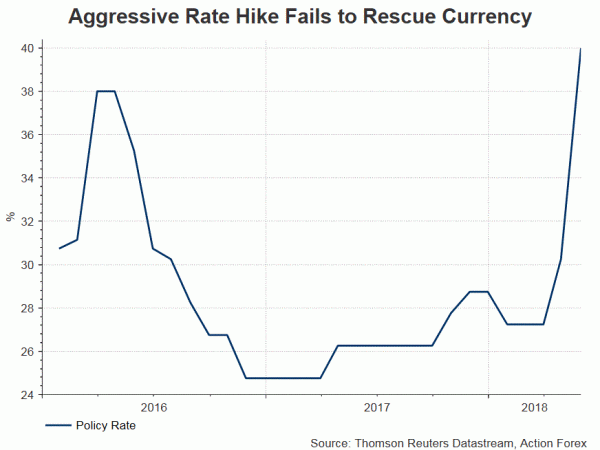Failure to rescue currency slump despite aggressive rate hike has led Argentina to seek IMF bailout. Last week, it was reported by the government has asked for a flexible credit line worth $30B from the world lender. According to President Mauricio Macri, “this is going to allow us to strengthen our growth and development program” and “allow us to face the new global scenario and avoid a crisis like the ones we have faced before in our history”. In its statement released on May 14, the IMF noted that an informal meeting is scheduled on May 18 with Argentina regarding the access of the funding program.
Causes of Peso’s Weakness
The country’s central bank lifted the policy rate to 30%, from 27%, on April 27, followed by two more hikes on May 3 and May 4, sending the rate to 40% at present. Despite the aggressive moves, the recovery on peso (ARS) was muted. Closing at a record low of 24.9 per USD, ARS has dived -18% so far this month and down over -30% from December last year. The recent weakness in peso has been driven by a confluence of the following factors. Monetary policy divergence between the US and other economies has re-emerged as the theme since 2Q17. Solid US economic indicators have raised speculations the Fed might raise interest rates for four times this year. This comes in contrast with a less hawkish/ more dovish stance of other central banks (e.g. BOE, BOC, ECB). The divergence has led to capital flow to the US from other countries, resulting in renewed strength in US dollar. the divergence was exacerbated by the mistaken monetary policy decisions made by the Argentinean central bank which cut the policy rate twice in January.
On the economic front, Argentina has been suffering from high Inflation which has stayed at elevated level of 25%, despite a significant decline from 40% in 2016. Record high current account deficit has reached nearly 5% of GDP and about 39% of the country’s total exports. The country has been financing much of its fiscal deficit (3.9% of GDP in 2017) with FX-denominated public debt, which has taken up around 65% of the total. While the government has pledged to trim the fiscal deficit to 2.7% of GDP this year, via a series of reforms including reduction in spending and tariff. The path could be challenging. Indeed, political pressure to change the utilities tariffs scheme earlier this month has already sent the government’s popularity to a record low since President Macri took office.


IMF Bailout: A 2001 Deja Vu
The current problem is reminiscent of Argentinean crisis in 2001/02 (peso was pegged to US back then), when depressing economic and financial conditions had led the Latin American country to seek funding from the IMF. The stringent austerity measures associated with the program have been criticized as a major cause of the downward spiral of Argentina’s depression. Eventually, Argentina the then-new President Rodriguez Saá announced the default on US$ 93B of the sovereign debt in December 2001. As much as four different presidents had tried to rule Argentina in that single month. Yet, none of them managed to remain in office. The economy contracted by -28% from 1998 to 2002.
The relation between the IMF and Argentina has been contentious since then. The crisis has revealed the fragility of the IMF’s economic solution. This is notoriously known as the Washington Consensus which prescribes the “standard” reform package to virtually all countries with economic and financial problems. The IMF, as well as the World Bank, usually fails to customize solutions specific to the country in question. We expect Argentina would secure bailout from the IMF, again with conditionality. We believe the government would have to implement more stringent fiscal consolidation than it has announced previously. While the pro-IMF camp suggests that an IMF program could help ensure discipline on fiscal consolidation, the market would remain cautious and volatility on emerging market currencies is expected.


